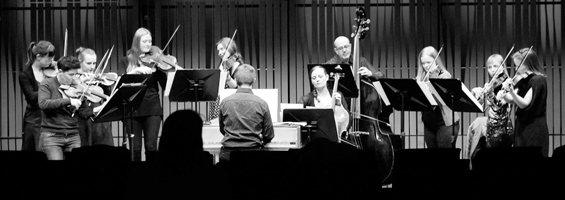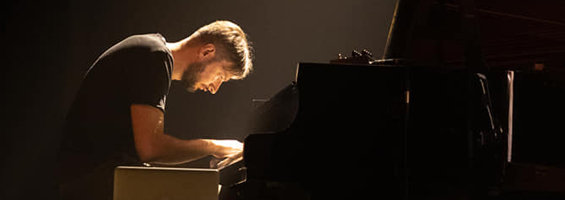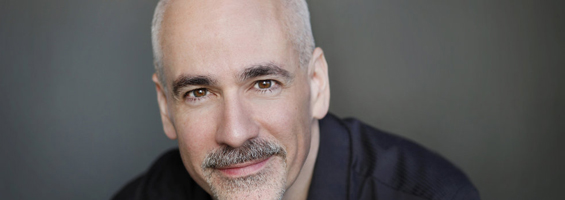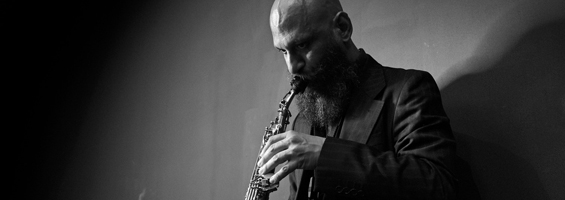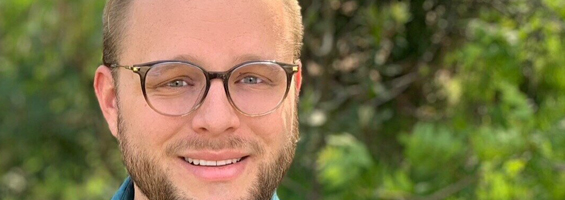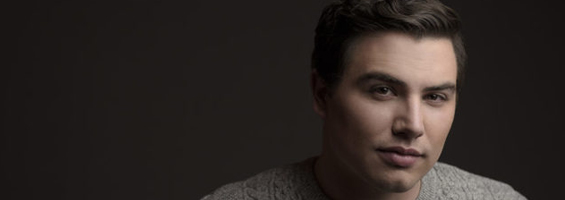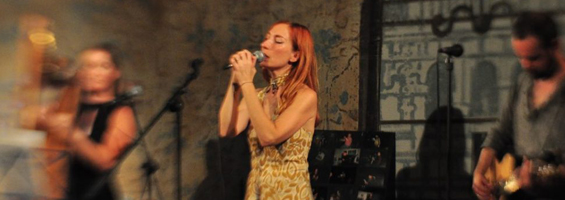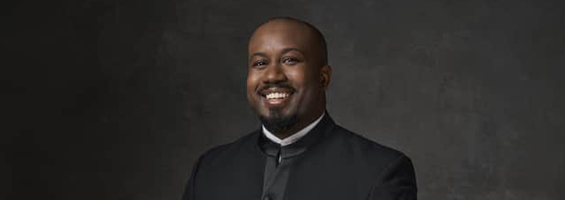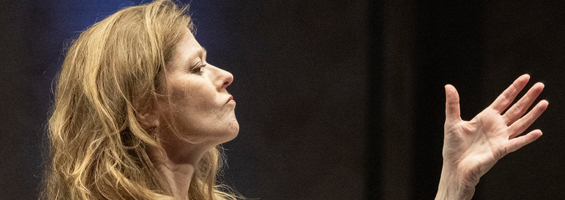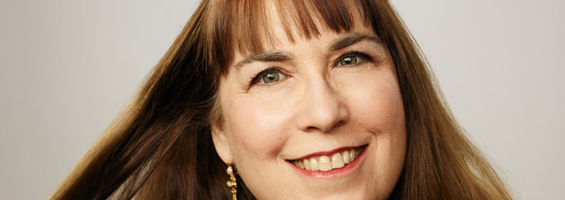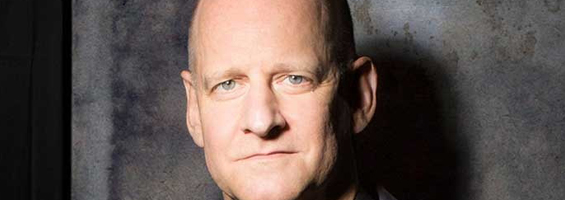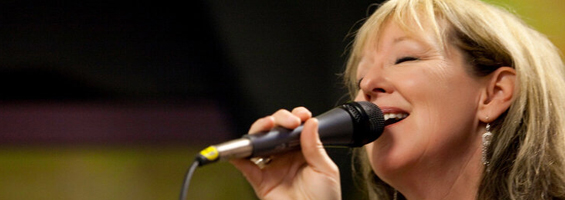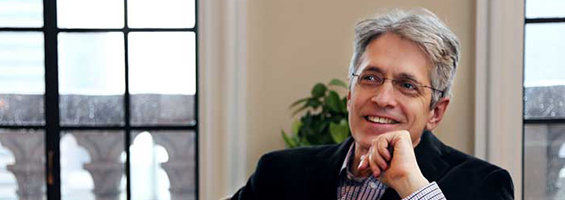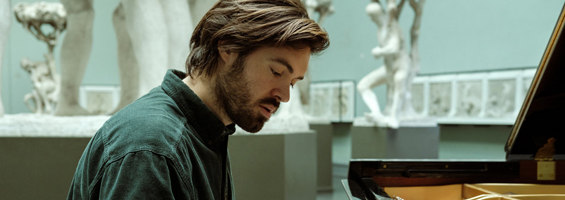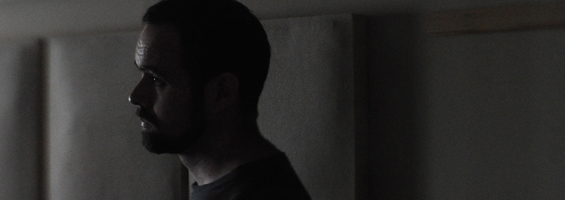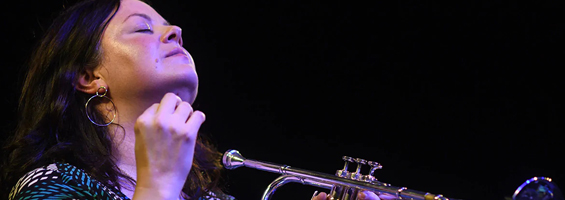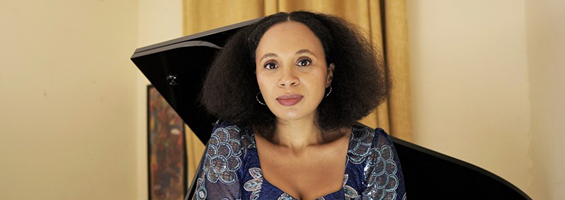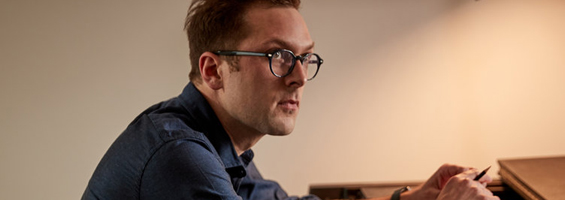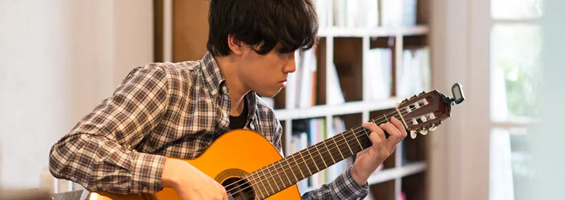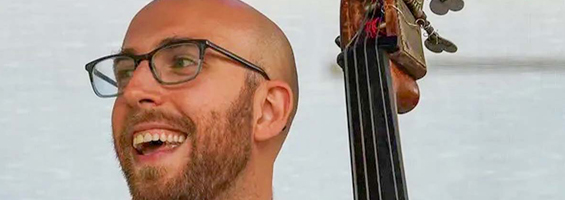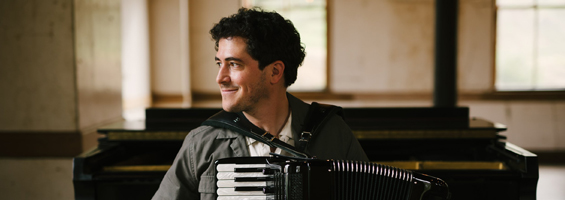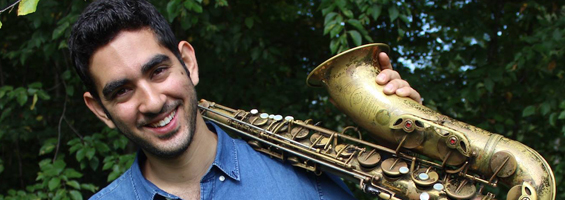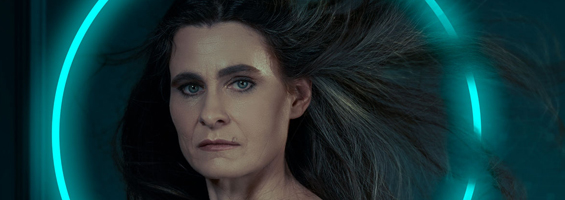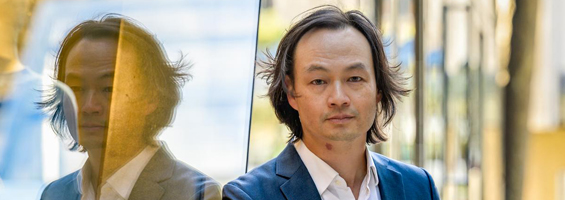
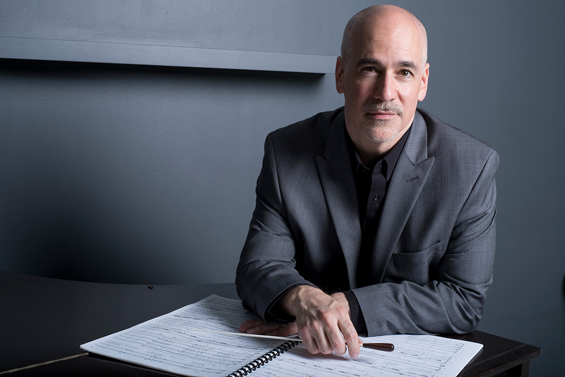
photo: Dario Acosta
2022 ARTIST PICKS
Every December textura asks artists whose releases were selected for that year's roundup (here) to highlight a work, musical, literary, or otherwise, that helped sustain them during the year. Herewith, for your reading pleasure and edification, are their picks. textura is immensely grateful to those who, at an especially busy time of the year, contributed to the article and thanks them for their generosity.
Lynne Arriale • Barokkbandið Brák • Bruno Bavota • Peter Boyer • Eli Degibri • Jeffrey Derus • Eric Ferring • Anne Garner • Kellen Gray • Barbara Hannigan • Sverre Knut Johansen • Florian Just • Lori Laitman • Lowell Liebermann • Karen Marguth • Ben Moore • Kjetil Mulelid • James Murray • Nadje Noordhuis • Rebeca Omordia • Scott Ordway • Paniyolo • Ethan Philion • Sam Reider • Daniel Rotem • Eric Schorr • Nerissa Schwarz • Christopher Tin
Lynne Arriale (#7 Jazz: The Lights Are Always On, Challenge Records International)
What has inspired me the most is the bravery and dedication of two groups of people: medical professionals who risked everything, including their lives, to care for a nation besieged by COVID-19; and those who defended our Capitol, our elected representatives, and our Constitution on January 6th.
Barokkbandið Brák (#20 Classical [Instrumental]: Two Sides, Sono Luminus)
(Laufey Jensdóttir, violinist and founding member of the ensemble) As a large ensemble we have various tastes in music and many different favourites, but here's my pick. Released in 2021, the album Abundance by Sophie Fetokaki is a big favourite. Her silky smooth voice combined with beautiful guitar playing is otherworldly. Sophie has a background in classical music, but the album taps into folk and traditional music.
Bruno Bavota & Chantal Acda (#18 Ambient / New Age: A Closer Distance, Temporary Residence)
(Bruno Bavota) The Netflix series Extraordinary Attorney Woo. In the big hole of home entertainment I discovered this South-Korean TV production just a few weeks ago. It follows Woo Young-Woo, a female rookie attorney who is on the autism spectrum. I found this series to be brilliant! I experienced all the emotions possible as sometimes the show is fragile and sometimes humorous, and watching the episodes you're never bored. Also if you like whales, dolphins, or other marine mammals, this is exactly the show for you.
Peter Boyer (#5 Classical [Instrumental]: Balance of Power, Naxos American Classics)
During 2022, I've been deeply impressed and inspired by Steven Spielberg's remake of West Side Story, which was released in late 2021, having been delayed by the Covid pandemic. Like many American composers, I grew up admiring Bernstein's seminal score for this musical in its various incarnations: the original 1957 Broadway cast; the ubiquitous 1961 film musical; the Symphonic Dances for orchestra without voices; Bernstein's own 1984 recording; and others. The product of a singularly brilliant collaboration between Jerome Robbins, Arthur Laurents, Bernstein, and the then-young Stephen Sondheim, WSS redefined American musical theatre; and the original 1961 film, winner of ten Academy Awards, left an indelible imprint on American popular culture. To remake the film in a meaningful and relevant way sixty years later would seem an almost impossibly high bar to reach, and yet Steven Spielberg and his team did just that, with tremendous creativity, talent, and passion.
As a friend of Jamie Bernstein, the composer's daughter, I had heard some tantalizing behind-the-scenes stories of recording sessions and more, prior to the film's release, and I knew that Spielberg's film would be something very special; but it is truly revelatory in many ways. In my view, Tony Kushner's screenplay honoured Arthur Laurents's original while adding new elements in imaginative and relevant ways, and the same can be said of Justin Peck's choreography with respect to Jerome Robbins's original work. With its brilliantly talented cast of actors/singers, the New York Philharmonic (with additional recording by the Los Angeles Philharmonic) conducted by Gustavo Dudamel, and the work of David Newman, Jeanine Tesori, engineer Shawn Murphy, and many others, Bernstein's score has never sounded better than it does on the 2021 soundtrack—and that's saying quite a lot. Spielberg's mastery of cinematic techniques provides for many powerful moments. To name just two, the violence of the rumble is far more realistic and shattering than in the original film, and the use of cross-cutting to the other characters' situations while Rita Moreno's Valentina sings "Somewhere" is heartbreaking. Though the film was not a box office success, having been released in the later stages of the pandemic, in my view it is an artistic triumph, and I have no doubt that I and many others will draw inspiration from it for a long time to come.
Eli Degibri (#6 Jazz: Henri & Rachel, Eli Degibri)
Al Foster has been my musical (and later personal) hero since I first heard him play live in Israel at the Red Sea Jazz Festival with the legendary Joe Henderson somewhere at the beginning of the ‘90s. I believe my constant search for ‘the right melody' is thanks to Al! I've had the great honour of playing in his band for over ten years. This year Al released Reflections accompanied by stellar musicians: Nicholas Payton, Chris Potter, Kevin Hays, and Vicente Archer. Each of them has been a tremendous and meaningful inspiration for my playing. Just like Al, they all share the same philosophy on the importance of playing lyrically and singing through your instrument. Every note that Al ever played had this intention behind it. This also goes for this incredible recording, which is filled with Al's heartfelt original compositions, exceptional standards, and the most sensitive and pristine playing. It is all about Love, Peace, and Jazz (Real Jazz)!
Jeffrey Derus (#5 Classical [Vocal]: From Wilderness, Navona Records)
A work that profoundly moved me this year was Appalachian Spring by Aaron Copland. It's an oldie but will forever be a goodie. Being drawn to nature and how music can paint every colour of a landscape, this work has inspired me again and again. Most of my work has involved translating landscapes into soundscapes while telling a story that relates to our human experience. I strive to find connections between the sonic and physical worlds and show the visual beauty of life through an audible lens.
Eric Ferring (#8 Classical [Vocal]: No Choice But Love: Songs of the LGBTQ+ Community, Lexicon Classics)
As everyone who has been a performer knows, our lives as traveling performing artists can be filled with solitude, some may even say it can be rather lonesome. This year, to combat those feelings, I've turned to books for an escape, specifically fantasy and sci-fi (sorry, no non-fiction here!). I just finished my thirty-sixth book of the year, and here are four favourites:
Andy Weir's Project Hail Mary: If you're looking for a sci-fi/space drama, look no further than Project Hail Mary. From the author of the book-turned-filmThe Martian, featuring Matt Damon, Project Hail Mary is sure to grip you from beginning to end. If the character survives, he may just end up finding himself, a friend, and a family far, far away from home.
Sarah J. Maas's Crescent City: From the writer of the also-fantastic A Court of Thorns and Roses series, Crescent City will give you a complex world-building experience. Perhaps overwhelming at first, the two substantial books in the series so far will be hard to put down. For those reading my book recommendations, there is some spicy content in this book: be warned.
T. J. Klune's The House on the Cerulean Sea: I absolutely adore T. J. Klune, and I've read almost everything he's ever written (I'm anxiously waiting a new book release next year!). T. J. is not only an LGBTQ+ writer, but his stories centre largely on queer characters and queer love. His books were a revelation to this married gay man, and I hope they are as illuminating to other LGBTQ+ people. We cannot understate how important it is to see yourself in the world around you: on stage, in recordings, in films, in books. The House on the Cerulean Sea is a beautiful, feel-good story based around an orphanage for magical youth. T.J.'s other series, Tales of Verania, The Green Creek series, Immemorial Year, and his other stand-alone books, like Under the Whispering Door, are all worth reading. Some have spicier content than others, be warned!
V. E. Schwab's Shades of Magic: Though most known for the gorgeous historical fiction/fantasy book The Invisible Life of Addie LaRue, the Shades of Magic trilogy (though more books are on their way, I'm told!) is an incredibly well-written and well-constructed book. The characters are challenging, frustrating, and completely and utterly themselves. I'd highly suggest this trilogy to any fantasy book lovers who like medium complexity in their world building (I'd consider Crescent City high-level world building, as a reference) with great writing and characters. A must-read!
Anne Garner (#1 Ambient / New Age: Dear Unknown, Slowcraft)
I recently attended the opening night of the London Independent Animation Festival and was really impressed by the work of Will Anderson. Betty is a short film about heartbreak that shows two funny little birds fall in and out of love. I found it especially moving since it becomes clear during the film that the story is itself a way for the filmmaker to move past a relationship that didn't work out. I love that in the right hands even simple animated shapes can have such strong emotional impact. Another gift this year was Jeanette Winterson's memoir Why be Happy When You Could be Normal? I really related to some aspects of the weird, oppressive religious environment she was raised in, though where she found books and writing for survival and solace I found music and painting. What a brave and beautiful woman to share her story with us; she makes me want to be bolder, to speak out more of my truth.
Kellen Gray & RNO (#17 Classical [Instrumental]: African American Voices, LINN)
Ralph Vaughan Williams' Symphony No. 5: He wrote his fifth between 1938-1943, contemporary to the second World War. Having been an ambulance driver and stretcher-barrier in his WW1 service, Vaughan Williams wrote the symphony not of the triumph and action of battle. On the contrary, his fifth reflects sounds that heal the soul of its turmoil. During such a hectic time as this, his fifth symphony has been a calming balm for my soul over the last year.
Barbara Hannigan (#9 Classical [Vocal]: Sehnsucht: Berg - Mahler: Live in Rotterdam, Alpha Classics)
My favourite recording of the year is Bertrand Chamayou's solo piano album of Messiaen's intensely meditative Vingt Regards sur l'enfant Jésus (Warner Classics). From the first time I heard Bertrand play, some years ago, I thought I was listening to a kind of water-flow of sound and emotion that sounded like a piano but … not. It was as if Bertrand had transformed the instrument into an extension of his own humanity, voice, and vision; the sounds were both familiar and foreign to me, in their intense lyricism and colour-world. My suggestion: turn down the lights, put this album on, and let it lead you into another equilibrium…
Sverre Knut Johansen (#10 Ambient / New Age: Metahuman, Spotted Peccary)
2022 was a year with a lot of work in my studio and often with photographs as a starting point. The music has now been composed, so we'll see eventually what this turns out to be! On the Metahuman album, I couldn't crack the code for an image, so it's nice to have a super creative art designer, Daniel Pipetone, who solved this task for me. I have to try to think a bit ahead now that I have a thirty-year anniversary in 2024 for the Distant Shore album from 1994. Maybe there will be new music? In any case, I have all of 2023 to compose something that will be a worthy sequel. The first album was a special experience and for me the start of my musical journey. If we talk about film and music, which I appreciate, then 2001: A Space Odyssey cannot be overlooked. It's not just the film itself, but also the music and how these are put together. It is pure magic and feels real in many ways.

photo: Florian Just (2nd from left)
Florian Just (#17 Classical [Vocal]: Eternelle Dualité: Songs of Love & War, Etcetera Records)
I still own and enjoy a pretty vast CD collection. It is considered to be old fashioned already and lots of my friends, family, and acquaintances have stepped over to stream-only and giving or simply throwing away their collections. It puts us artists in a challenging position since we need to publish physical recordings too. For me, the CD is not (yet) replaceable by a pure digital format. I enjoy browsing my collection with my finger and letting my eyes create a connection between the title at the thin back of the case and the world of music that I know is inside; it's almost like a ritual. Before the CD it was even more ceremonial when we took the LP out of its case, cleaning it carefully, gently putting the arm of the needle into position. Sitting down in front of the music, not alongside it.
There is one CD that is played in our family home for every Sunday morning breakfast, and with its music I instantly can sense the scent of fresh-baked bread rolls and the taste of soft boiled egg: Baroque Festival with Camerata Bern, a recording from 1985 with the greatest hits of feel-good baroque music by Bach, Pachelbel (yes, the Canon in D), Albinoni, and Purcell. A guilty pleasure since no contemporary recording would give in to the kind of romantic approach of this old gem. My children only knew 90% of the CD because of scratches that transformed the last piece, Purcell's Pavane and Chaconne, into a piece of repetitive minimalist music. After ten years I finally remembered that I had once digitalized the CD, and I surprised my two kids one Sunday morning with the missing 10%. My youngest boy started to get up from the table to stop the Phillip Glass-Purcell when they both froze in shocked-like amazement because of the smooth continuation of their life-long favourite breakfast music. I since then aim to digitalize more of the core items in my collection. It is getting more difficult to be old fashioned ...
Lori Laitman (#4 Classical [Vocal]: The Ocean of Eternity, Acis)
I loved reading To Paradise by Hanya Yanagihara. This long book is divided into three parts. Although set in three countries over several centuries, the same characters' names and same mansion in Washington Square Park are constants. Also, interestingly, in these alternate universes, gay marriage is legal. Hanya's imagination is breathtaking and her writing transported me. I cried at the end of each section.
I also learned so much from Ken Burns' documentary The U.S. and the Holocaust, although it was definitely difficult to watch. The amount of new information is astonishing and compellingly presented. I feel this should be required watching for everyone.
Lowell Liebermann (#14 Classical [Instrumental]: The Devil's Lyre / Personal Demons, Steinway & Sons)
A great source of joy for me during 2022 was the discovery of the music of Anton Reicha, particularly his Études dans le genre Fugué, Opus 97, a set of thirty-four preludes and fugues "à l'usage des jeunes Compositeurs." It is a volume full of beauty, inventiveness, and surprises. I spent many happy isolation hours exploring the pleasures of this grand work.
Karen Marguth (#24 Jazz: Until, OA2 Records)
2022 was a continuation of my journey to minimize clutter in my life, a journey that started during the pandemic. The podcast called The Minimalists along with Joshua Becker's books got me started while I was stuck at home, and in the process of cleaning things out I came across a crop of unreleased recordings I'd made back in 2012. Re-finding and re-listening to those recordings was such a gift; I'd forgotten them and how good they sounded. Perhaps most importantly, they included work by the late, great drummer Brian Hamada, and so releasing them to the world felt like sharing his spirit which is so alive in the way he plays. If you're a drummer, I recommend listening carefully to his playing on the album. It'll inspire you.
Ben Moore (#7 Classical [Vocal]: Gathering, Delos)
Books, movies, recordings, operas, and several theatre shows all had an impact on me and my writing in 2022. To choose one favourite is tough, but Liz Callaway's cabaret show at New York's 54 Below this past March stands out. It was an evening of songs by Stephen Sondheim called To Steve with Love. Liz delivered each song with an exquisite simplicity that somehow also conveyed the depth of feeling and complex psychology of each piece. In my younger days I was mainly drawn to passionate, no-holds-barred operatic music. Over time Sondheim's own brand of passion has captivated me more and more. It satisfies on so many levels. In fact, he sets such a high standard for composers and lyricists that it can be daunting at times. But no matter what genre of music you're working in, Sondheim can be a guiding light. And Liz Callaway seems to be the perfect vehicle for his work.
I'm proud to have Liz's voice on my own recording of songs, Gathering. And take note: Liz's To Steve with Love is now available on a live recording.
Kjetil Mulelid (#19 Jazz: Who Do You Love The Most?, Rune Grammofon)
This year I've been lucky to be exposed to a lot of the work of the Norwegian stone mason and sculptor Gustav Vigeland. It is an ancient form of art, and his works are also over 100 years old. Anyway, I got to hold three concerts in his museum in Oslo this year, and the presence of his art when I was playing really affected me, both in the present during the concerts and during the rest of the year. If you're in Oslo sometimes you should definitely go visit the museum after walking around in the famous Vigeland Park.
Also, everyone should check out Selma French and her new record Changes Like The Weather in The Mountain. Beautiful music!James Murray (#16 Ambient / New Age: Careful Now, Home Normal)
Far and away my music highlight of the year was seeing Pavement live at The Roundhouse in Camden at the end of October. I missed them when they toured over here in their ‘90s heyday and the subsequent reunions, and I'm now glad that I did. This was one of the most committed, joyous performances I've seen from anyone ever, one of my all-time favourite bands on blistering form ... moving and magnificent.
Nadje Noordhuis (#2 Jazz: Full Circle, Newvelle Records)
The book that I found quite impossible to put down this year was Suleika Jaouad's memoir Between Two Kingdoms. It's a deeply moving journal of her cancer diagnosis, and how she moved through years of chronic illness and self-discovery. The stand-out film of 2022 that was incredibly clever and engaging was Dan Kwan and Daniel Scheinert's Everything Everywhere All At Once. It's a little hard to describe, but it's a surrealist tale about a Chinese immigrant who has to save the world through exploring parallel universes. Michelle Yeoh is unbelievable in her leading role. I love listening to Swedish metal band Ghost's latest album Impera. The songwriting is impeccable, and the theatrical arc of anonymous band characters, complete with costumes and changing lead singer personas, is very entertaining. It's a band that I enjoy listening to with my nine-year-old nephew, and we even have matching Ghost t-shirts.
Rebeca Omordia (#4 Classical [Instrumental]: African Pianism, Somm Recordings)
Christian Onyeji's Ufie, Igbo dance for piano: My grandfather was Chief Musician "Okwa - Ekpere" and he was invited to perform Oja, an Igbo flute, at important traditional ceremonies in Igboland, South Eastern part of Nigeria. When writing African classical music, Nigerian composers use traditional music and instruments as their main source of inspiration. Ufie, Igbo dance for piano by Nigerian composer Christian Onyeji draws its inspiration from the Ufie percussion ensembles in the Anambra part of Igboland. Ufie music embodies dignity and nobility and is associated with the men of honour in the society, and it is performed during important ceremonial occasions—the coronation of an Igbo King, festivals, at the funeral of a title person, and other significant communal events. There is an Igbo proverb that says,"The drum calls on a great man only two times: in life and in death." Onyeji's Ufie, Igbo dance for piano bears the characteristics of Ufie music while using drumming techniques on the piano. Its Igbo rhythms and melodies engage the performer and the audience alike!
Scott Ordway (#11 Classical [Vocal]: The Outer Edge of Youth, Acis; #7 Classical [Instrumental]: The Clearing and the Forest, Acis)
In 2022, I read, re-read, and re-read again a small novel by the mid-century Norwegian writer Tarjei Vesaas. Archipelago Books, the irreplaceable Brooklyn publisher of world literature, brought out a new English translation by Torbjørn Støverud and Michael Barnes in 2016. I came across it while doing research for my choral opera, The Outer Edge of Youth.
The Birds (1957) tells the story of a young man called Mattis. He is keenly attuned to the beauty and mystery of the natural world, so much so that he can't quite find his place in the society around him. He understands the birds with alarming—perhaps supernatural—clarity but routinely fails to comprehend the meaning and implications of the human voices that constantly tell him what to do, where to go, who to love, and how to live. He is a man apart.
The prose style is simple, unadorned, and gorgeously transparent. The outlines of the story, too, have something of a fairy-tale quality about them. We feel Mattis's intense connection to the sea, the forest, the sky, and the animals, but it's never clear exactly where or when the action takes place. As in Benjy's narrative thread in The Sound and Fury, the reader's world is circumscribed by the limitations of what Mattis can see, hear, and understand.
The simplicity of Vesaas's style and narrative bely a profound and touching study of human sensitivity, a celebration of those who are better equipped to listen than to act, and a critique of an uncompromising social order that makes scant accommodation for those who are even a little bit different. For me, these themes resonate powerfully in our own unsettled age.
Paniyolo & Miho Ota (#9 Ambient / New Age: Sora to Hana, Schole)
(Paniyolo:) Thank you for selecting Sora to Hana. I have released three albums this year: Sora to Hana, Monophonic Guitar, and Every Day; I am very attached to all of the albums. My favourite album of the year is Arctic Monkeys' The Car. The cover photo and the music are all very beautiful. I have another favourite, Kathleen Frances' Through the Blue. This is also a very beautiful album.
Ethan Philion (#23 Jazz: Meditations on Mingus, Sunnyside Records)
I've found myself coming back time and time again to bassist Rick Rosato's masterful solo album Homage. I was familiar with him from his work with Joel Ross and Marta Sanchez so was intrigued when I saw news about his upcoming solo record and even more interested when I learned that the subject of ‘homage' the title referred to was the Delta blues. The album, which clocks in at a quick twenty-three minutes, reflects a deeply personal connection to the blues—the result of Rosato's deep study into the history, language, and spirit of the Delta blues during the pandemic—and the resulting arrangements reflect both a personal connection to the music and a reverence for the tradition. His use of alternate tunings as well as mutes and other ‘prepared' additions to the bass means each song sounds distinct and give the songs the same guttural, aching characteristics of the original versions by artists like Muddy Waters, Skip James, and Mississippi John Hurts. The only original composition on the album, the opener "Homage," is a particular standout, as are his renditions of "Cherry Ball Blues" and "I Can't Be Satisfied." Rosato unlocks the full emotional range of the bass, and the resulting music is a joy to get lost in.
Sam Reider (#9 Jazz: Petrichor, Slow & Steady )
My selection is “The Homeless Wanderer” by Emahoy Tsegue-Maryam Guebrou. This was one of the recordings that inspired my solo piano record, Petrichor. An Ethiopian nun, Guebrou's compositions and piano feel to me like an irresistible mix of Chopin and the blues. It's hard to tell where her compositions end and her improvisations begin, and that's one of the things I like best. The quality of the recording immediately transports me to a faraway time and place—when I hear this track I see her vividly sitting at an old piano in a large tile-floored room. Her musical directness and originality are what I strive for in all my work. She deserves to be known far and wide.
Daniel Rotem (#8 Jazz: Wise One, Daniel Rotem)
I absolutely love reading, and a book that I recently read and found particularly moving is Buchmendel by Austrian author Stefan Zweig from 1929. The short story presents the chronicles of a book peddler named Jakob Mendel, an esoteric and eccentric yet respected member of the Viennese cultural community. The sad story finds Mendel, a Jewish Russian immigrant, dispatched to a concentration camp in the years following World War I. Upon his return, Mendel is not the same; he is not as sharp as he once was and is not appreciated by the new owners of the coffee shop where he once used to sit and work. He dies alone and forgotten, a relic from a different time, irrelevant in the eyes of the society of the new world. Though the story is very short, it is written in such an intimate, thoughtful way, that I found myself drawn in and feeling deeply involved despite its length.
In my mind, I see ripples and occurrences in time all connected in one way or another. Mendel's story from 1929 could easily be seen through the lenses of 2022, a world post-WWI can be seen as a world post-pandemic. The sanctity of something that is genuine, original, uncompromising not only by principal or dogma, but by mere nature, and how such an element fails to yield against the tides of change; a world in which technology is not only helpful and innovative, but also dangerous and unforgiving in its tendency to flatten everything out and make everything (and everyone) singular, almost one dimensional. With hatred and antisemitism on the rise these days, I would hope more people read and learn about the history. Mendel's story is one of many, of a community of people that endured the worst persecution time and time again, yet persevered and struggled to facilitate beauty and opportunity not only for its own members but also for the rest of the world. Buchmendel is also a reflection on the importance of art, passion, and originality, in the face of the mundane and harsh. Lastly it is a call to honour the dedication and commitment it takes to dive deep into something that is beyond mortality—like music, art, literature. In a world where true art doesn't always account for much in the materialistic realm, one can appreciate its true significance in reminding people what is actually important, the true essence of being alive.
As far as albums go, I'd like to mention two: the first is Activities by bassist Anna Butterss. Anna happens to be a very close friend of mine, but she is also a powerful creator, uncompromising artist, and a vital member of the LA creative music community. She released her debut as part of the new label Colorfield Records spearheaded by musician and engineer Pete Min. The music speaks for itself, and I can't recommend you listen to it enough.
The second album is LongGone, by Joshua Redman, Brad Mehldau, Christian McBride, and Brian Blade. The four master musicians need no introduction as they have been active for decades, inspiring and encouraging listeners all over the world. What I love about this record is their ability to create something that is a reflection of the years-long relationships they have with each other, while offering a new take—a new perspective—that feels very fresh and relevant. The compositions are all beautiful, the playing superb, and to me it encompasses and celebrates the feeling of art that is created in the moment. I love discovering new music and checking out new records, but oftentimes, it is older, ‘classic' albums that I find myself playing on rotation. LongGone has been on rotation since I first heard it, a truly inspiring piece of art, a modern classic.
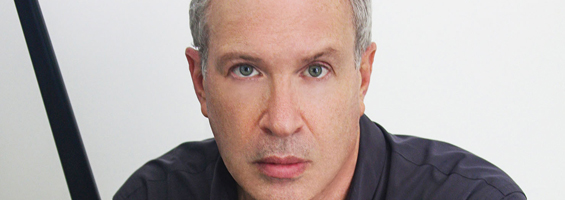
photo: American Composers Alliance
Eric Schorr (#6 Classical [Vocal]: New York Pretending To Be Paris, Albany Records)
This year I took a deep dive into the work of two writers: one of music, Gabriel Fauré; and one of words, Willa Cather. I found great escape and solace in both, which was especially valuable, given the craziness of the world in which we live. Importantly, I also found in their writing inspiration for my own— their seductive melodies of notes and words coursed through my brain, unlocked powerful memories, and provided profound neural stimulation. Both writers embrace humanity in a relatable yet sophisticated fashion, which is what I strive for in my own work.
I was well familiar with Fauré's work but hadn't spent quality time with it in a long while. My binge-listening was prompted by spotting the score of his Requiem on the bookshelf—it was one of the first choral works I ever sang. Its forty minutes of music left an indelible impression on me in when I was in college and now, years later, my appreciation for it, and Fauré's music in general, has only grown.
I hadn't read Cather until my friend, Benjamin Taylor, who's coming out with a new biography, urged me to do so. I'd always had this image of her as old-fashioned, but I couldn't have been more wrong. Each of the many novels I read seemed fresh and relevant. The Professor's House is my favourite. It transported me far beyond my own experience and yet packed a resonantly emotional wallop. Another reason why I became so attracted to Cather is that music figures so prominently in her work.
While their lifespans overlapped, it's extremely unlikely that Fauré would have read any Cather and certainly not The Professor's House (it was published in 1925 and Fauré died in 1924). It's somewhat less unlikely that Cather listened to Fauré's music. But I like to think she did—and that she enjoyed it immensely. How lucky I've been to live with them both, many times over, in 2022.
Nerissa Schwarz (#8 Ambient / New Age: New Eyes For Laika, Nerissa Schwarz)
In early 2022 I discovered the books of Emily St. John Mandel, who has become my favourite contemporary writer alongside Haruki Murakami. The novel that introduced me to her work was Station Eleven, a complex story about the eve and aftermath of a ravaging pandemic (which in my opinion is much better than the TV series it was made into). Though it is obviously a very dark tale, it offers a glimmer of hope and optimism as some of the survivors rediscover art and civilization in the face of an apocalyptic catastrophe. It also manages to be cleverly constructed, moving, thought-provoking, grippingly entertaining and quite original at the same time—I don't know many novels that can pull off that feat. Disturbing and strangely comforting, Station Eleven made a big impression on me in 2022.
Christopher Tin (#3 Classical [Vocal]: The Lost Birds, Decca Classics)
They say that the music that you listen to when you're thirteen imprints itself on you and shapes the way you think about music for the rest of your life. During one of the more frustrating stretches of 2022, I rediscovered all the old classic rock bands I listened to in my youth: Pink Floyd, The Beatles, The Who, The Rolling Stones, The Beach Boys, etc. Now that I'm in my forties, all those old albums hit differently. I now appreciate their structural ingenuity, experimentation, and complex lyrics as a middle-aged man. But the real joy has been sharing those songs with my four-year-old, Penny. While she certainly has her own favourite children's songs, she's been fascinated by what her dad loves to listen to. And for this reason, I'll choose as my go-to track for 2022 The Beatles classic, "Get Back,” (as well as the Peter Jackson documentary series by the same name). Both the song and TV show remind us that whatever strange twists and turns our lives might take, sometimes we just want to get back to our rock and roll roots.
December 2022![]()

